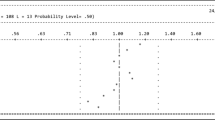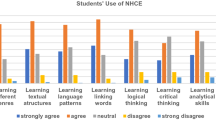Abstract
The paradigms of teaching and learning are undergoing a rapid transition in the present era of information and communication technology, and this is also true for the study of the English language. Through the use of approaches like flipped learning, blended learning, and a content-based approach, the learners can be given a very suitable environment. However, the most likely option for an efficient learning process is the growth and promotion of critical thinking (CT) in pupils. It encourages kids to reason clearly and make intelligent decisions. The goal of the current study is to analyze and provide an overview of the numerous methods and skills that can help language learners develop their critical thinking. It was determined that the attitudes and knowledge of the teachers play a significant role in the development of the class’s thinking mindset. The improvement of the candidates’ problem solving and thinking skills is greatly helped by improved teaching methodologies and assessment methods. The proposed study has identified a number of features after thoroughly examining the existing research on the development of CT in English language learning, and significant features were selected from them. With the use of the chosen features and the application of the graph theory matrix approach (GTMA), the alternatives were ranked in order of preference. The current investigation has taken this into account and provided a thorough summary of the information currently available on the research topic. The research shows a variety of ways to analyze text so that students can come up with new ideas about the topic.





Similar content being viewed by others
Data availability
Enquiries about data availability should be directed to the authors.
References
Bagheri F (2015) The relationship between critical thinking and language learning strategies of EFL learners. J Lang Teach Res 6(5):969
Davidson BW, Dunham RL (1996) Assessing EFL student progress in critical thinking with the Ennis-Weir critical thinking essay test. Education Resources Information Center
Fu H, Wang J (2021) Cultivation of critical thinking skills in college English writing under blended learning model. Creat Educ 12(7):1485–1493
Goda Y, Yamada M, Matsukawa H, Hata K, Yasunami S (2014) Conversation with a chatbot before an online EFL group discussion and the effects on critical thinking. J Inf Syst Educ 13(1):1–7
Gustafson M, Bochner J (2009) Assessing critical thinking skills in students with limited English proficiency. Assess Update 21(4):8–10
Karapetian AO (2020) Creating ESP-based language learning environment to foster critical thinking capabilities in students’ papers. Eur J Educ Res 9(2):717–728
Liaw M-L (2007) Content-based reading and writing for critical thinking skills in an EFL context. Engl Teach Learn 31(2):45–87
Liu C, Hou J, Tu Y-F, Wang Y, Hwang G-J (2021) Incorporating a reflective thinking promoting mechanism into artificial intelligence-supported English writing environments. Interact Learn Environ 2021:1–19
Masduqi H (2011) Critical thinking skills and meaning in English language teaching. Teflin J 22(2):185–200
Mehta SR, Al-Mahrooqi R (2015) Can thinking be taught? Linking critical thinking and writing in an EFL context. RELC J 46(1):23–36
Muhammadiyeva H, Mahkamova D, Valiyeva S, Tojiboyev I (2020) The role of critical thinking in develo** speaking skills. Int J Integr Educ 3(1):62–64
Nejmaoui N (2019) Improving EFL learners’ critical thinking skills in argumentative writing. Engl Lang Teach 12(1):98–109
Ordem E (2017) Develo** critical-thinking dispositions in a listening/speaking class. Engl Lang Teach 10(1):50–55
Qi L (2019) The critical thinking ability culitivating in college English course in the artificial intelligent age. Front Educ Res 2(5):48–54
Rao RV (2006) A material selection model using graph theory and matrix approach. Mater Sci Eng A 431(1–2):248–255
Rezaee M, Farahian M, Ahmadi AM (2012) "Critical thinking in higher education: unfulfilled expectations. Broad Res Artif Intell Neurosci 3(2):64–73
Setiawan A, Bharati DAL (2018) Develo** HOT project-based-speaking assessment to stimulate the Students™ critical thinking and creativity. Engl Educ J 8(3):301–307
Shirkhani S, Fahim M (2011) Enhancing critical thinking in foreign language learners. Procedia Soc Behav Sci 29:111–115
Toshpulatova D, Kinjemuratova A (2020) Teacher perceptions on develo** students’ critical thinking skills in academic English module. Int J Psycho Educ Sci 9(1):48–60
Wale BD, Bishaw KS (2020) Effects of using inquiry-based learning on EFL students’ critical thinking skills. Asian Pac J Second Foreign Language Education 5(1):1–14
Yang Y-TC, Wu W-CI (2012) Digital storytelling for enhancing student academic achievement, critical thinking, and learning motivation: a year-long experimental study. Comput Educ 59(2):339–352
Zaitseva N, Symonenko S, Osadchyi V (2022) A blended English for specific purposes course with the focus on critical thinking skills development for computer science students. J Phys Conf Ser 2288(1):012037
Zakian M (2018) The interplay among EFL teachers teaching experience, critical thinking, and classroom management. Broad Res Artif Intell Neurosci 9:30–38
Zhang L, Kim S (2018) Critical thinking cultivation in Chinese college English classes. Engl Lang Teach 11(8):1–6
Zhao C, Pandian A, Singh MKM (2016) Instructional strategies for develo** critical thinking in EFL classrooms. Engl Lang Teach 9(10):14–21
Funding
1. Foreign Language Research Joint Project of Social Science Foundation of Hunan Province (No. 2021WLH35). 2. Teaching Reform Project in colleges and universities of Hunan province (No. HNJG-2020-1208).
Author information
Authors and Affiliations
Corresponding author
Ethics declarations
Conflict of interest
The authors have not disclosed any competing interests.
Ethical approval
The paper does not deal with any ethical problems.
Informed consent
We declare that all the authors have informed consent.
Additional information
Publisher's Note
Springer Nature remains neutral with regard to jurisdictional claims in published maps and institutional affiliations.
Rights and permissions
Springer Nature or its licensor (e.g. a society or other partner) holds exclusive rights to this article under a publishing agreement with the author(s) or other rightsholder(s); author self-archiving of the accepted manuscript version of this article is solely governed by the terms of such publishing agreement and applicable law.
About this article
Cite this article
Peng, F. Evaluating critical thinking of English learners using modern technologies and GTMA. Soft Comput (2023). https://doi.org/10.1007/s00500-023-08127-7
Accepted:
Published:
DOI: https://doi.org/10.1007/s00500-023-08127-7




